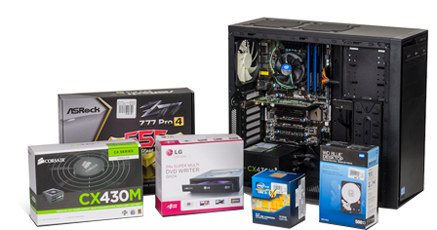Computer Upgrades
Why should I upgrade rather than buy a new computer?
Why should I upgrade rather than buy a new computer? Well, although it’s totally up to you to make that personal decision, many people on a tight budget decide to revitalize their computer by upgrading only key components to bring it back to a higher level of performance; faster and more powerful than before, without costing the Earth.
What is sad is that many people are given false/inaccurate information in order to make them believe they need to buy a whole new computer rather than upgrading their existing computer.
Consider this (assuming you have your computer protected and you’re not infected with viruses): have you noticed your computer is not as fast as when you first bought it? Why does Windows take ages to load up? When you are using your beloved Word Processor, do you find that you‘re typing faster than the icon on your screen can keep up with on your document?

These are just a couple of symptoms, but there are many reasons that cause your computer’s performance to slow down over time. Have you ever given your computer a service? If not, why not have a look at our Computer Servicing page first.
When you have made the time to consider your options, then maybe it’s time to upgrade. We can help you maximise your funds towards effective upgrades towards certain parts of your machine. In most cases, Computers / Laptop upgrades need not be cost prohibitive for the majority of customers as upgrades tend to be either but not limited to:
- Operating system (software)
- Memory
- Processor
- Graphics card
- Hard drives
| Upgrade Types | Guideline |
|---|---|
| Operating System (OS) |
An Operating System (OS) is software that manages the computer hardware and software resources and provides common services for computer programs. The operating system is an essential component of the system software in a computer system. Application programs usually require an OS to function and the operating system over time will be superseded by a new OS. It will be time to upgrade to the new OS, but be mindful there are always benefits and downfalls to an upgrade. Normally newly launched OS are designed to run faster and utilize new hardware technology. |
| Random Access Memory (RAM) | A good sign that you would benefit from having more RAM installed in your computer is when your computer slows down when you're trying to run several programs simultaneously. Increasing the amount of RAM will help. Generally speaking, you can never have enough RAM, but always check to see what the maximum amount of physical RAM your computer can have installed, as there will be limitations with older computers. |
| Video Graphics Card (VGC) |
There are two types of Video Graphics card, Integrated and Dedicated Integrated Graphic Cards that are built into the motherboards and generally, 'share' the physical RAM installed on your motherboard. Dedicated Graphics Cards are purchased separately and don't come built into the motherboard. These days, they come with their own dedicated memory. Because graphics processing uses memory, a graphics card upgrade may improve overall performance. If you work with a lot of digital videos, you can most definitely benefit from adding RAM and/or changing from an integrated graphics card to a dedicated graphics card. However, please ensure that your motherboard can support the new card technology before buying it! |
| Hard Drive (HD) |
If you're running out of storage space, you can upgrade an HD with more storage capacity or even better (if space allows for it), keep your existing drive and add a new one. If your computer is slow, upgrading to a faster HD will help improve overall performance:
|
| Processor (CPU) |
A faster CPU can help your computer run faster, but this is not an easy upgrade and should be approached with caution. Keep in mind that performance improvements with a faster CPU may be negligible without sufficient RAM. When installing a new CPU, the important consideration (besides the number of cores and speed) is finding one that will work in your motherboard. |

